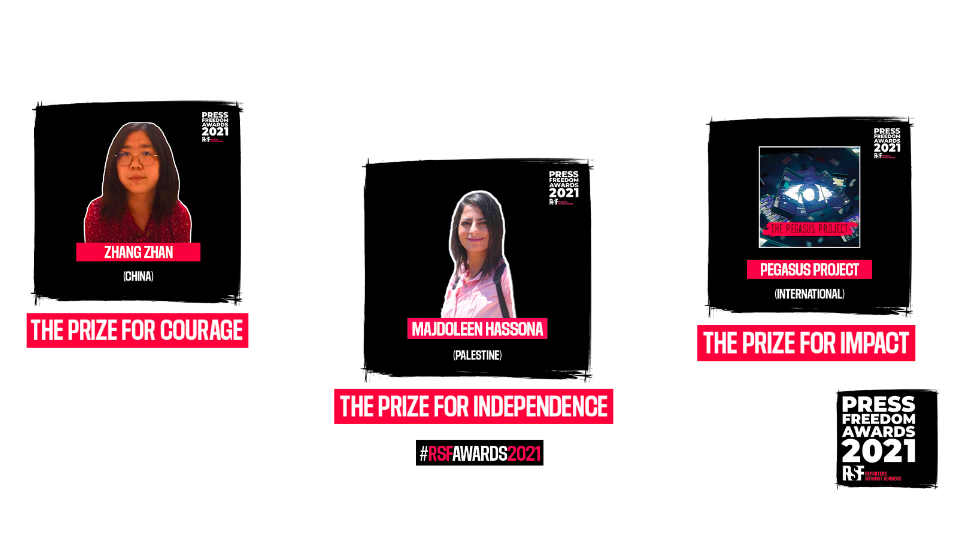Reporters Without Borders Presents Press Freedom Awards

The Reporters Without Borders (RSF) organization presented its 29th Press Freedom Awards on Thursday, giving them to Chinese journalist Zhang Zhan, Palestinian journalist Majdoleen Hassona, and research on the Pegasus spyware.
The prize in the category “Journalistic Courage” went to Chinese journalist Zhang Zhan. Despite threats from the authorities, she had reported on the early stages of the Covid-19 pandemic in the city of Wuhan in February 2020. Using social media, she had shown live conditions on the city’s streets and in its hospitals, as well as harassment faced by the families of those who had fallen ill. RSF calls her reporting one of the “most important independent sources on the situation.”
Zhang Zhan was arrested in May 2020 and held for months without contact with the outside world and without being given any reason. She was then sentenced to four years in prison at the end of December for allegedly “picking quarrels and provoking trouble.” To protest the sentence, the journalist, who had originally worked as a lawyer, went on hunger strike. As a result, she was restrained and force-fed. RSF reports that her health has deteriorated considerably in recent weeks and that her relatives fear for her life.
Organizations demand release
As recently as the end of September, numerous organizations, including RSF and Amnesty International, had called for Zhang Zhan’s immediate release. The German government is also advocating for this (in German).
Activist Jane Wang, who is campaigning for Zhang Zhan’s release, gave the acceptance speech. She said, “Zhang Zhan reminds us of how the Chinese authorities control the media by blocking information and arresting people.” She added that it is not known how many more people in China have been arrested for reporting on Corona.
RSF Secretary General Christophe Deloire commented, “Zhang Zhan, the winner in the ‘Courage’ category, is in prison and in a life-threatening condition, all for defying censorship and alerting the world to what was happening in China during the pandemic that was just beginning.”
Palestinian journalist Majdoleen Hassona
Palestinian journalist Majdoleen Hassona was awarded the Independence Prize. She works for the Turkish television station TRT in Istanbul. Before she went to Turkey, Israeli and Palestinian authorities had already regularly persecuted and harassed her for her publications. She had reported critically on the political situation there.
After returning to her home country in August 2019, she was detained at an Israeli checkpoint. “For security reasons,” she was denied permission to leave the country. Since then, Majdoleen Hassona is still in the West Bank, continuing her work there. In June 2021, when she reported on anti-government protests following the death of an activist, she was beaten by Palestinian security officials, according to RSF.
Surveillance uncovered
The “Pegasus Project” received the award for Impact. In the summer, the journalists’ consortium had revealed how media workers, human rights activists and opposition activists around the world were being monitored using the Pegasus spyware from the Israeli manufacturer NSO. Almost 200 journalists were on a list of phone numbers apparently selected by democratic and autocratic governments as potential spying targets.
The research was coordinated by the organization Forbidden Stories and received technical support from Amnesty International. In total, more than 80 journalists from 17 media outlets in eleven countries were involved. Among them were Die Zeit, the Süddeutsche Zeitung, the British Guardian, the Washington Post and the Israeli daily Haaretz.
The “Pegasus Project” had drawn the world’s attention to the extent of surveillance that media professionals are subjected to in many countries, Reporters Without Borders said. The revelations had also prompted the organization to file a complaint in Paris together with two Moroccan-French journalists. There, the public prosecutor’s office is to clarify who is responsible for the targeted surveillance of media workers. UN human rights activists, RSF and other organizations are also calling for a worldwide moratorium on the sale and transfer of surveillance technologies.
Prize awarded since 1992
RSF Secretary General Deloire summed up: “All this vividly illustrates the state of journalism in the world today. The RSF Award laureates embody the noblest journalistic qualities and also pay the highest price because of this. They deserve not only our admiration but also our support.”
This year, four female journalists, two male journalists and six media or journalist organizations from a total of eleven countries were nominated. An international jury chaired by RSF President Pierre Haski decided on the winners.
The Press Freedom Awards were established in 1992. After Berlin in 2019 and Taipei in 2020, the award has now been presented without an accompanying event. The acceptance speeches can be viewed on Reporters Without Borders’ website. (js)